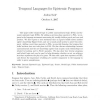Free Online Productivity Tools
i2Speak
i2Symbol
i2OCR
iTex2Img
iWeb2Print
iWeb2Shot
i2Type
iPdf2Split
iPdf2Merge
i2Bopomofo
i2Arabic
i2Style
i2Image
i2PDF
iLatex2Rtf
Sci2ools
138
Voted
JOLLI
2008
2008
Temporal Languages for Epistemic Programs
This paper adds temporal logic to public announcement logic (PAL) and dynamic epistemic logic (DEL). By adding a previous-time operator to PAL, we express in the language statements concerning the muddy children puzzle and sum and product. We also express a true statement that an agent's beliefs about another agent's knowledge flipped twice, and use a sound proof system to prove this statement. Adding a next-time operator to PAL, we provide formulas that express that belief revision does not take place in PAL. We also discuss relationships between announcements and the new knowledge agents thus acquire; such relationships are related to learning and to Fitch's paradox. We also show how inverse programs and hybrid logic each can be used to help determine whether or not an arbitrary structure represents the play of a game. We then add a past-time operator to DEL, and discuss the importance of adding yet another component to the language in order to prove completeness.
Related Content
| Added | 13 Dec 2010 |
| Updated | 13 Dec 2010 |
| Type | Journal |
| Year | 2008 |
| Where | JOLLI |
| Authors | Joshua Sack |
Comments (0)

